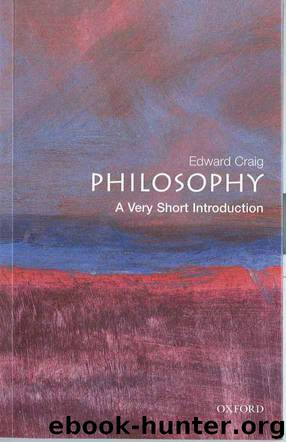Philosophy - A Very Short Introduction by Edward Craig

Author:Edward Craig
Language: eng
Format: mobi
Published: 2010-10-28T17:10:38.197000+00:00
10. Every subject talks its own talk.
In a rough and ready way we all make a distinction between perceiving and thinking. It is one thing to see the objects on your table, notice that one is a pen and one a computer; it is another thing to think about them, wonder if they still work, or what to do if they don’t. And we are used to the idea that astronomers spend long hours looking at the sky, whereas mathematicians just seem to sit there working things out, feeling no need to look at anything at all except what they themselves have written down. So here, on the face of it, are two quite different ways of acquiring knowledge. Some philosophers have favoured one of them at the expense of the other: ‘empiricism’ is a very general word for doctrines that favour perceiving over thinking, ‘rationalism’ for doctrines that favour thinking over perceiving.
There may have been philosophers who held that only what could be perceived could be known, so allowing no cognitive powers at all to thought, inference and reason. Something of much that kind is reported of the Loka¯yatas, whom we met above in connection with materialism. According to some reports of their thinking they went even further, saying that only what can be perceived exists. If so (but remember that all the reports we have were written by their opponents!), they surely overreached themselves. Nobody who thinks that knowledge is only of what you have perceived can claim to know that nothing imperceptible exists, since that isn’t something you could possibly perceive. (It would make as much sense as claiming to be able to hear that nothing inaudible exists.)
An empiricist who holds that only perception yields knowledge need not be saying that the process of perception itself involves no thought whatever, so that we can have as it were pure perception untainted by any thinking. Even to look at my table and see that there is a pen on it requires more of me than just passively registering the light patterns that enter my eyes. I need to know a little about pens, at the very least about what they look like, and then bring this knowledge to bear, otherwise I shall no more see a pen than does the camera with which we photograph the pen. Perception is interpretative, whereas cameras merely record patterns of light. So a less crude empiricism will allow that classification, thought, inference, and reason all have their legitimate role. But it will take its stand on the point that they cannot generate a single item of knowledge on their own. It may be true that there is no thought-free perception; but it is also true that there is no perception-free knowledge. All claims to knowledge answer, in the end, to perception; it may be possible for them to go beyond perception, but they must start from it.
The empiricist can offer a powerful argument for this view; any wouldbe rationalist must have an answer ready.
Download
This site does not store any files on its server. We only index and link to content provided by other sites. Please contact the content providers to delete copyright contents if any and email us, we'll remove relevant links or contents immediately.
The remains of the day by Kazuo Ishiguro(8962)
Tools of Titans by Timothy Ferriss(8359)
Giovanni's Room by James Baldwin(7313)
The Black Swan by Nassim Nicholas Taleb(7097)
Inner Engineering: A Yogi's Guide to Joy by Sadhguru(6783)
The Way of Zen by Alan W. Watts(6589)
Asking the Right Questions: A Guide to Critical Thinking by M. Neil Browne & Stuart M. Keeley(5751)
The Power of Now: A Guide to Spiritual Enlightenment by Eckhart Tolle(5741)
The Six Wives Of Henry VIII (WOMEN IN HISTORY) by Fraser Antonia(5493)
Astrophysics for People in a Hurry by Neil DeGrasse Tyson(5172)
Housekeeping by Marilynne Robinson(4433)
12 Rules for Life by Jordan B. Peterson(4298)
Double Down (Diary of a Wimpy Kid Book 11) by Jeff Kinney(4257)
The Ethical Slut by Janet W. Hardy(4236)
Skin in the Game by Nassim Nicholas Taleb(4232)
Ikigai by Héctor García & Francesc Miralles(4229)
The Art of Happiness by The Dalai Lama(4118)
Skin in the Game: Hidden Asymmetries in Daily Life by Nassim Nicholas Taleb(3986)
Walking by Henry David Thoreau(3949)
